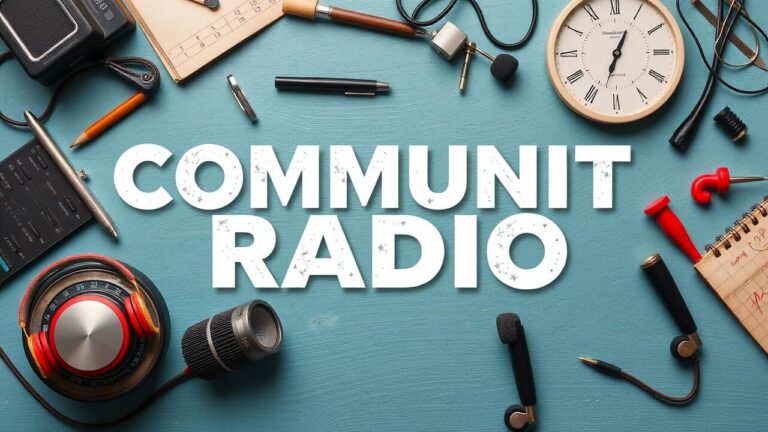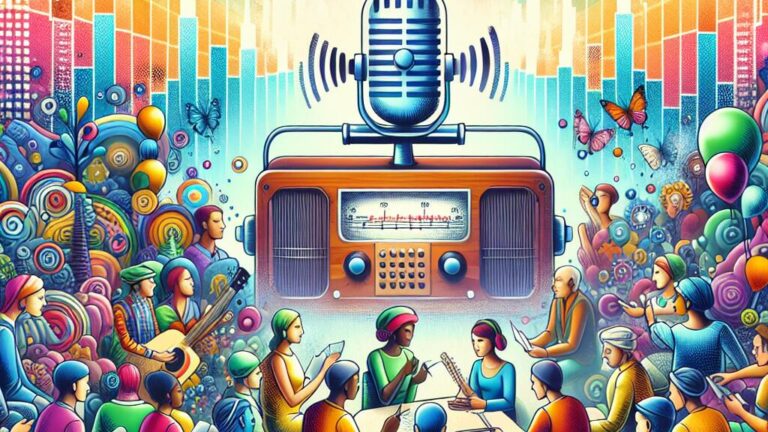Why community radio is a powerful tool for community engagement
Table Of Contents
Discover Why Community Radio is a Powerful Tool for Community Engagement
Key Takeaways
- Comprehending local broadcasting
- The significance of local broadcasting in nearby areas
- Reasons local broadcasting serves as an effective instrument for community involvement
- The influence of local broadcasting on societal matters
- Fostering a feeling of identity and community
- Obstacles encountered by local broadcasting outlets
Understanding Community Radio
Community radio serves as a vital link in promoting civic engagement within communities, offering a platform for local voices and diverse perspectives. These community radio stations embrace various radio formats that reflect the unique culture and needs of their listeners. By emphasizing inclusivity and civic participation, community radios empower individuals to express their opinions and engage in meaningful conversations about social issues. This localized approach not only contrasts with national public radio but also enhances community bonds and fosters a sense of belonging. Recognizing why community radio is a powerful tool for community engagement allows us to appreciate its role in shaping informed and active citizens.
Definition and Purpose of Community Radio
Community radio serves as an essential platform for empowering marginalized communities. With its focus on local content, these radio stations highlight the voices that often go unheard. Community radio fosters grassroots movements and offers discussion forums that allow for activism on various issues. By providing access to information and encouraging participation, initiatives like Radio Okapi exemplify why community radio is a powerful tool for community engagement. These stations can mobilize listeners around important topics, such as environmental activism, making them vital components of local advocacy.
The purpose of community radio extends beyond mere broadcasting. It functions as a means of celebrating cultural diversity while strengthening community bonds. Unlike mainstream media, which may focus on broader narratives, community radio prioritizes local stories and issues. This approach creates a sense of belonging among listeners, encouraging them to engage with their community. As they share their perspectives, these radios also confront challenges posed by commercial and pirate radio stations, solidifying their role as trusted sources of information and catalysts for change.
Historical Context and Evolution
Community radio emerged in response to the limitations of commercial radio, which often prioritizes profit over local needs. Activists and community members recognized the necessity for a platform that amplified underrepresented voices, particularly within indigenous communities. This led to the establishment of stations like Radio Sagarmatha in Nepal, acting as a beacon for collective action and empowerment. Volunteerism played a critical role in this evolution, with many passionate individuals dedicating their time to foster a sense of community. The growth of listening audiences demonstrated the demand for a more inclusive medium, showcasing why community radio is a powerful tool for community engagement.
The history of community radio is also marked by the phenomenon of pirate radio, which emerged as a rebellious alternative to mainstream broadcasting. These unlicensed stations often attracted significant listenership, particularly in areas where commercial media failed to reflect local cultures. Over time, legitimate community radio began to emerge, providing a platform for local storytellers, musicians, and activists. Through participatory programming, these stations empowered volunteers and nurtured relationships within the community. This evolution highlights the enduring impact of community radio on fostering local engagement and building networks of support within diverse populations.
The Role of Community Radio in Local Communities
Community radio serves as a vital platform for fostering dialogue and raising awareness about civic rights and social justice within local communities. It operates outside the mainstream media, allowing for a more diverse and multicultural discourse that reflects the unique voices of its listeners. Through FM broadcasting, these stations empower educators and community members to engage in meaningful conversations, addressing pertinent issues that affect their lives. The collaborative nature of community radio encourages participation from various stakeholders, making it a powerful tool for community engagement. Fundraising efforts often involve the community directly, creating a sense of ownership and responsibility toward the station and its programming.
- Community radio provides a voice for marginalized groups, ensuring their perspectives are heard.
- It fosters local talent by offering platforms for emerging musicians, artists, and content creators.
- The stations often serve as a hub for local news, keeping residents informed about events and developments in their area.
- Community radio promotes local culture and traditions, helping to preserve the unique identity of the community.
- It encourages volunteerism and skill development, as community members can take part in station operations.
- Educational programming can improve literacy and media skills among listeners, enhancing overall community knowledge.
- Through collaborations with local organizations, community radio can support various social initiatives and promote community cohesion.
Fostering Local Voices
Community radio organizations are instrumental in amplifying community voices. These platforms allow individuals from all walks of life to share their stories and perspectives, fostering a sense of belonging. Many community radio initiatives prioritize local community engagement, creating programming that reflects the unique experiences and cultures of their audiences. This grassroots approach not only showcases diverse viewpoints but also highlights the resilience of community members, ensuring that everyone has a voice in conversations affecting their lives.
Community radio daily serves as a vital resource for the public radio mission of informing and educating listeners. By focusing on local issues and events, community radio programming strengthens connections within the community. Local radio initiatives cultivate trust and understanding among residents, empowering them to participate actively in discussions that shape their neighborhoods. This involvement reinforces why community radio is a powerful tool for community engagement, ultimately leading to a more informed and cohesive community.
Bridging Communication Gaps
Community radio serves as a vital link for disseminating important community announcements, ensuring that residents receive timely information relevant to their lives. This platform encourages community members to listen actively and engage in discussions that voice community needs. By fostering community dialogue, stations like Harrogate Community Radio enhance the relationship between community leaders and residents. Community partnerships also play a significant role, as they support local initiatives and strengthen the fabric of society.
Through its grassroots approach, indigenous community radio exemplifies why community radio is a powerful tool for community engagement. These stations not only amplify diverse voices but also empower communities to address their unique challenges. By facilitating community discussions, radio stations become a powerful tool for social change and community empowerment. Listening to local voices helps bridge communication gaps, allowing for a more informed and connected community.
Why Community Radio is a Powerful Tool for Community Engagement
Community radio serves as an essential platform for local engagement, providing a voice to diverse groups within the community. By focusing on specific community needs, community-based broadcasters create radio programs that reflect and address community issues and values. This engagement fosters a strong connection between listeners and broadcasters, cultivating a sense of belonging and ownership. Aboriginal community radio, for instance, plays a vital role in preserving cultural heritage while promoting community service and inclusion. Initiatives led by community broadcasters encourage participation, allowing residents to share their stories and concerns. Ultimately, this local broadcasting not only empowers individuals but also reinforces the fabric of the community by ensuring that every voice counts in shaping community dialogue. Understanding why community radio is a powerful tool for community engagement highlights its potential to inspire positive change within local contexts.
Encouraging Participation and Inclusivity
Community radio serves as a crucial platform that encourages participation and inclusivity among local community members. By promoting outreach initiatives, these stations engage a diverse audience in community conversations about local affairs. This involvement fosters active participation in community events and dialogues, allowing residents to voice their opinions and concerns. The result is a vibrant tapestry of perspectives that reflect the needs and aspirations of the whole community, showcasing why community radio is a powerful tool for community engagement.
The public radio core values underpin the mission of community radio, emphasizing listener engagement and community development. Stations often invite feedback, collaboration, and contributions from residents, ensuring that programming resonates with the lives and experiences of local community members. By creating an inclusive environment, community radio cultivates a sense of ownership among listeners, allowing them to view themselves as integral parts of their community’s narrative. This dynamic not only impacts communities positively but also reinforces the importance of participatory media in shaping social dynamics.
Building Trust and Relationships
Community radio serves as a vital mechanism for cultivating trust and relationships within local communities. By offering platforms for youth-run radio programs, it engages younger generations in civic conversations that matter to them. Such initiatives not only prioritize the community-focused essence of broadcasting but also create interactive forums where diverse voices can be heard. For underserved communities and remote areas, this engagement fosters a sense of belonging, making local community members feel valued and connected.
Public radio journalists play a crucial role in building these relationships, often dedicated to highlighting the issues and stories unique to their regions. Through open discussions and regular programming, community radio becomes a trusted source of information and a catalyst for strengthening community life. This dynamic environment enhances the bond between listeners and broadcasters, reinforcing why community radio is a powerful tool for community engagement.
The Impact of Community Radio on Social Issues
Community radio plays a crucial role in addressing social issues by serving as a platform for awareness and advocacy. By broadcasting radio signals that resonate within local communities, these stations create a forum for discussion and engagement. Local radio stations can unite people around specific initiatives and highlight the efforts of local organizations dedicated to social change. This grassroots approach fosters a dedicated listener base that feels empowered to support local initiatives. Understanding why community radio is a powerful tool for community engagement allows us to appreciate its ability to connect global communities and amplify voices that often go unheard. Through programs that celebrate diversity and encourage participation, community radio stands as a vital asset in promoting social awareness and collective action.
Promoting Awareness and Advocacy
Community radio serves as a vital platform for raising awareness about pressing social issues and advocating for change within local communities. By showcasing local talent and engaging dedicated volunteers, these stations play a critical role in providing exposure to those who may not otherwise have a voice. This local spotlight contrasts sharply with national radio stations that often overlook grassroots media. Through audience participation, community radio offers a space and the necessary tools to help tell stories that resonate on a personal level. This engagement empowers listeners to understand their civic responsibilities, reinforcing the idea that they can create social impact.
Organizations and individuals alike benefit from the tangible support that community radio offers. Programs designed to highlight local initiatives and advocate for essential causes resonate deeply with the audience. These grassroots media outlets often act as a radio gong, amplifying important messages throughout the community. By staying attuned to the concerns of their listeners, community radio stations foster a sense of ownership among residents. This unique relationship not only encourages participation but also motivates individuals to take action in addressing social challenges, showcasing why community radio is a powerful tool for community engagement.
Supporting Local Initiatives and Events
Community radio serves as an influential pillar for supporting local initiatives and events. Stations like Radio Tierra and various bush radio outlets often advocate for the artistic community by highlighting events that inspire and engage an active populace. These broadcasts not only inform listeners of upcoming meetings and gatherings but also encourage participation from diverse communities, ensuring that local interests are represented and celebrated.
This platform fosters collaboration between organizations and community members, enabling successful promotion of initiatives that resonate with residents. One top reason listeners tune into community radio is its commitment to addressing the unique needs of their neighborhoods, making it a powerful tool for community engagement. Radio production becomes a medium through which stories are shared, relationships strengthened, and collective identities forged around shared cultural and social interests.
| Event Name | Date | Location | Organizing Body |
|---|---|---|---|
| Local Arts Festival | June 15-17, 2023 | Community Park | Local Arts Council |
| Weekly Farmers Market | Every Saturday | Main Street Square | Community Farmers Association |
| Neighborhood Clean-Up Day | August 5, 2023 | Citywide | Neighborhood Association |
| Annual Cultural Parade | September 21, 2023 | Downtown Main Street | Cultural Heritage Group |
Building a Sense of Identity and Belonging
Community radio serves as a vital resource for enhancing the sense of identity and belonging within neighborhoods. By amplifying local voices, it fosters a platform where diverse communities, such as the Haitian community radio, can express their unique cultures and traditions. This medium encourages political participation and youth engagement, empowering individuals to take part in initiatives and health awareness campaigns. Collaboration among local organizations often leads to effective communication, strengthening community bonds and enhancing social cohesion. Events like Radiodays spotlight these contributions, showcasing why community radio is a powerful tool for community engagement and promoting a shared sense of identity.
- Community radio highlights local stories and traditions, enriching cultural awareness.
- It provides a space for marginalized groups to have their voices heard.
- Engagement through community radio can lead to enhanced local activism and civic responsibility.
- Programs and events foster intergenerational dialogue, connecting younger and older community members.
- Community radio encourages collaboration among various local organizations for shared goals.
- It serves as an educational platform, providing information on critical issues affecting the community.
- Listening to community radio can create a sense of unity and collective identity among residents.
Celebrating Cultural Diversity
Community radio serves as a platform that amplifies alternative voices within diverse communities. By fostering partnerships and collaboration, these stations inspire individuals to engage in local politics, including city council meetings. Such engagements encourage everyday listeners to become active participants in vital discussions that shape their neighborhoods. This active involvement enhances social impact and helps uncover the unique narratives that contribute to the rich tapestry of cultural diversity.
Through initiatives like “radio rookies,” community radio stations provide opportunities for underrepresented groups to express their stories and perspectives. This approach not only elevates the voices of marginalized populations but also cultivates a sense of belonging among community members. By celebrating cultural diversity, community radio strengthens relationships and builds a collaborative wave that resonates with the social impact we strive for in our communities.
Strengthening Community Bonds
Community radio serves as a vital platform for building stronger connections among local residents. By encouraging participation from individuals and volunteers, these stations create opportunities for members of the community to share their stories and experiences. Grassroots drama and meaningful reporting amplify the voices of vulnerable groups, ensuring their perspectives are heard. This dissemination of information fosters a sense of collective power among neighbors, allowing them to engage in awareness campaigns that address shared challenges and interests.
Through practical broadcasting experience, community radio nurtures relationships between different community members. Programs tailored to local needs invite everyone to contribute to discussions and events, enhancing the sense of belonging. By spotlighting local initiatives, community radio strengthens ties among residents, showing how collaboration can lead to positive change. As individuals come together to share their views and participate in activities, the bonds within the community are reinforced, demonstrating why community radio is a powerful tool for community engagement.
Challenges Faced by Community Radio Stations
Community radio stations play an important role in fostering collaboration among diverse voices within local communities. Despite being recognized as a powerful tool for community engagement, these stations often face significant challenges. Limited resources can hinder their efforts to promote social innovations and support indigenous remote communications. Local residents frequently encounter barriers that affect their involvement, leaving groups struggling to maintain strong connections with listeners. This disconnect can undermine the potential for societal dialogue, making it essential for community radio to secure the support needed to flourish and continue to serve its vital purpose in amplifying local narratives.
| Challenge | Description | Impact |
|---|---|---|
| Limited Funding | Community radio stations often operate on tight budgets, relying on donations and grants. | Restricts programming options and operational sustainability. |
| Technical Constraints | Outdated equipment and technology can hinder broadcast quality and reach. | Limits audience engagement and the station’s ability to adapt to new media landscapes. |
| Volunteer Reliance | Many community stations depend on volunteers for staffing and operations. | Inconsistency in programming and potential burnout among dedicated volunteers. |
| Lack of Awareness | Community members may not be aware of existing local radio stations and their offerings. | Reduces potential listenership and community engagement. |
| Regulatory Challenges | Navigating broadcasting regulations and licensing can be complex and time-consuming. | May deter new stations from establishing themselves and limit growth opportunities for existing ones. |
Conclusion
Community radio serves as a vital platform for amplifying local voices and fostering inclusive discussions. Why community radio is a powerful tool for community engagement becomes evident through its role in addressing social justice issues and health awareness campaigns. These stations empower listeners by providing a space for community members to share their experiences and perspectives. Through active participation, community radio strengthens relationships and encourages a sense of belonging, making it an essential resource for promoting social change and community cohesion.
FAQS
How does community radio help in empowering marginalised communities and fostering collaboration within local community initiatives?
Community radio plays a critical role in empowering marginalised communities by providing a platform to raise awareness about local issues and engage listeners in community affairs. Community radio organisations create space and tools for storytelling, helping to inspire an engaged populace and build resilience among remote communities. By uniting people through dialogue and collaboration, community radio can significantly impact communities and create social impact, ensuring that the voices of diverse groups are heard and valued.
How can starting your own community radio station enhance local community engagement and strengthen community values?
Starting your own community radio station can significantly enhance local community engagement by providing a platform for community broadcasting that fosters collaboration. Community radio plays a critical role in providing local talent with exposure to their communities and inspires participation in engagement initiatives. It offers a space and tools to help tell stories and create social impact. This inclusive media platform helps to facilitate community dialogues and strengthen the resilience of community radio initiatives, ensuring that community values are shared and celebrated effectively.
How can local community radio stations foster collaboration and create social impact within their neighborhoods?
Local community radio stations play a critical role in providing a platform for local talent with exposure to their communities. They provide a space and tools to help tell stories and foster collaboration among residents, thereby enhancing social impact. This collaboration wave in community radio encourages community–to–listen initiatives, engaging locals in meaningful dialogue to strengthen community resilience.
How can community radio build resilience within local neighborhoods and promote an inclusive environment for storytelling?
Community radio plays a critical role in providing local talent with exposure to their communities, allowing individuals to share their narratives and experiences. By providing a space and tools to help tell stories, community radio fosters resilience and social impact. We can see how radios role in this context helps to create an environment where the community–to listen and engage actively with one another, leading to meaningful connections and stronger neighborhoods.
How does community radio contribute to building resilience and creating social impact within local communities?
Community radio plays a critical role in providing local talent with exposure to their communities. It provides a space and tools to help tell stories and to create social impact. By fostering dialogue and supporting local voices, community radio helps enhance resilience and strengthens the social fabric of neighborhoods.
How does community radio contribute to building resilience and creating social impact in local neighborhoods?
Community radio plays a critical role in providing local talent with exposure to their communities, helping to build resilience by fostering connection and collaboration among residents. It provides a space and tools to help tell stories, allowing individuals to share their experiences and amplify their voices. In doing so, community radio can effectively create social impact.
In what ways does community radio, such as radio ada, play a critical role in providing local talent with exposure to their communities?
Community radio, including radio ada, provides a unique platform that plays a critical role in providing local talent with exposure to their communities. These stations offer a space and tools to help tell stories while fostering resilience within the community. By sharing local narratives and diverse perspectives, community radio can create social impact. We see this impact reflected in increased community engagement and the promotion of local voices, which ultimately contributes to a stronger social fabric.
In what ways can community radio provide a space and tools to help tell stories while fostering resilience in local communities?
Community radio plays a critical role in providing local talent with exposure to their communities and creates a platform for diverse voices. It helps to provide a space and tools to help tell stories, and to create social impact. By doing so, community radio strengthens resilience within communities and promotes social cohesion and engagement.
How can community radio initiatives promote resilience in local communities while providing a platform for local talent and fostering storytelling?
Community radio plays a critical role in providing local talent with exposure to their communities. It serves as a space and tools to help tell stories, thereby enhancing resilience within local neighborhoods. By supporting local voices, community radio can effectively contribute to social impact. We see community radio initiatives creating social impact through the resilience they foster in community narratives and connections.
How can community radio serve as a medium that fosters resilience and plays a critical role in showcasing local talent while creating social impact?
Community radio plays a critical role in providing local talent with exposure to their communities by offering a platform that allows individuals to share their stories and talents. Additionally, these stations provide a space and tools to help tell stories, which not only encourages local participation but also fosters resilience within the community. By engaging with local voices and addressing community issues, community radio contributes significantly to social impact.







